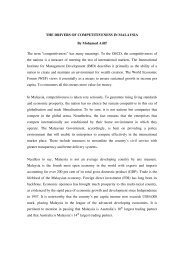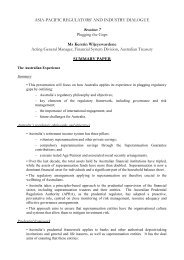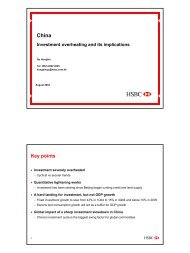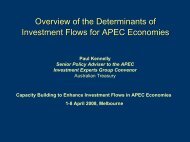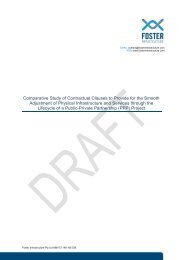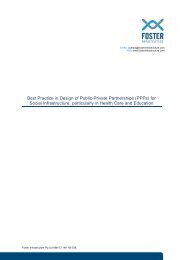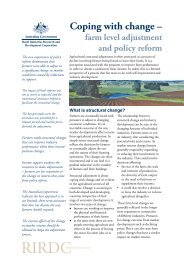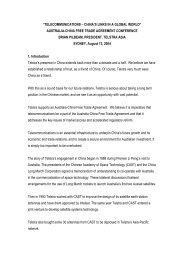Comparative Study of Contractual Clauses to Provide for the Smooth ...
Comparative Study of Contractual Clauses to Provide for the Smooth ...
Comparative Study of Contractual Clauses to Provide for the Smooth ...
- No tags were found...
Create successful ePaper yourself
Turn your PDF publications into a flip-book with our unique Google optimized e-Paper software.
<strong>Comparative</strong> <strong>Study</strong> <strong>of</strong> <strong>Contractual</strong> <strong>Clauses</strong> <strong>for</strong> <strong>the</strong> <strong>Smooth</strong> Adjustment <strong>of</strong> PhysicalInfrastructure and Services through <strong>the</strong> Lifecycle <strong>of</strong> a PPP ProjectAugust 20126 Conclusions and RecommendationsEconomies with well-developed PPP Frameworks have, through experience, developedcontractual mechanisms that introduce sufficient flexibility through <strong>the</strong> life <strong>of</strong> PPP contractsand allow <strong>for</strong> variations in <strong>the</strong> physical infrastructure or <strong>the</strong> services.The need <strong>for</strong> flexibility <strong>to</strong> implement variations in a PPP typically arises due <strong>to</strong> one <strong>of</strong> <strong>the</strong>following causes:1. government wishes <strong>to</strong> implement a new policy initiative2. government’s project-specific needs change.The types <strong>of</strong> variations required by government depend upon <strong>the</strong> nature <strong>of</strong> <strong>the</strong> infrastructure.Network issues are a common driver <strong>for</strong> variations in economic infrastructure PPPs,whereas interface issues are a common driver <strong>for</strong> variations in social infrastructure PPPsoperated by government.Based on <strong>the</strong> analysis <strong>of</strong> PPP Frameworks in this report, Foster Infrastructure has identified<strong>the</strong> following recommendations <strong>for</strong> <strong>the</strong> inclusion <strong>of</strong> flexibility in PPP contracts:1. PPP contracts should include a right <strong>for</strong> government <strong>to</strong> request changes <strong>to</strong> both<strong>the</strong> physical infrastructure delivered by <strong>the</strong> private party and <strong>the</strong> services providedby <strong>the</strong> private party.Some variations affect only <strong>the</strong> physical infrastructure (<strong>for</strong> example, installation a newelectrical socket in a classroom); some variations affect only <strong>the</strong> services provided by <strong>the</strong>private party (<strong>for</strong> example, a change in <strong>the</strong> acceptable range <strong>of</strong> temperature that <strong>the</strong>private party must maintain in a classroom); some variations affect both <strong>the</strong> physicalinfrastructure and <strong>the</strong> services.2. The contractual variation process should allow <strong>the</strong> private party sufficient time <strong>to</strong>consult with its subcontrac<strong>to</strong>rs and financiers be<strong>for</strong>e responding <strong>to</strong> a variationrequest from government.The assessment <strong>of</strong> variation requests can be a complex process. If <strong>the</strong> private party isnot given sufficient time <strong>to</strong> consult with its subcontrac<strong>to</strong>rs and financiers, its response <strong>to</strong><strong>the</strong> variation request is unlikely <strong>to</strong> be acceptable <strong>to</strong> government.3. Government should consider including in PPP contracts an obligation <strong>to</strong>compensate <strong>the</strong> private party <strong>for</strong> a percentage <strong>of</strong> its verifiable third party costs ifgovernment requests a significant variation but decides not <strong>to</strong> proceed with itafter it has been assessed by <strong>the</strong> private party.Sharing costs in this way ra<strong>the</strong>r than fully compensating <strong>the</strong> private party provides anincentive <strong>for</strong> government <strong>to</strong> refrain from requesting variations if it is not committed <strong>to</strong>proceeding, and an incentive <strong>for</strong> <strong>the</strong> private party <strong>to</strong> contain <strong>the</strong> costs <strong>of</strong> assessing <strong>the</strong>variation.4. PPP contracts should ei<strong>the</strong>r directly prescribe <strong>the</strong> limits on <strong>the</strong> size or nature <strong>of</strong><strong>the</strong> variations that government can require, or preserve <strong>the</strong> private party’srisk/reward outcome if <strong>the</strong> contract does not prescribe direct limits on <strong>the</strong> size ornature <strong>of</strong> <strong>the</strong> variations that government can require.Page 28 <strong>of</strong> 35Foster Infrastructure




